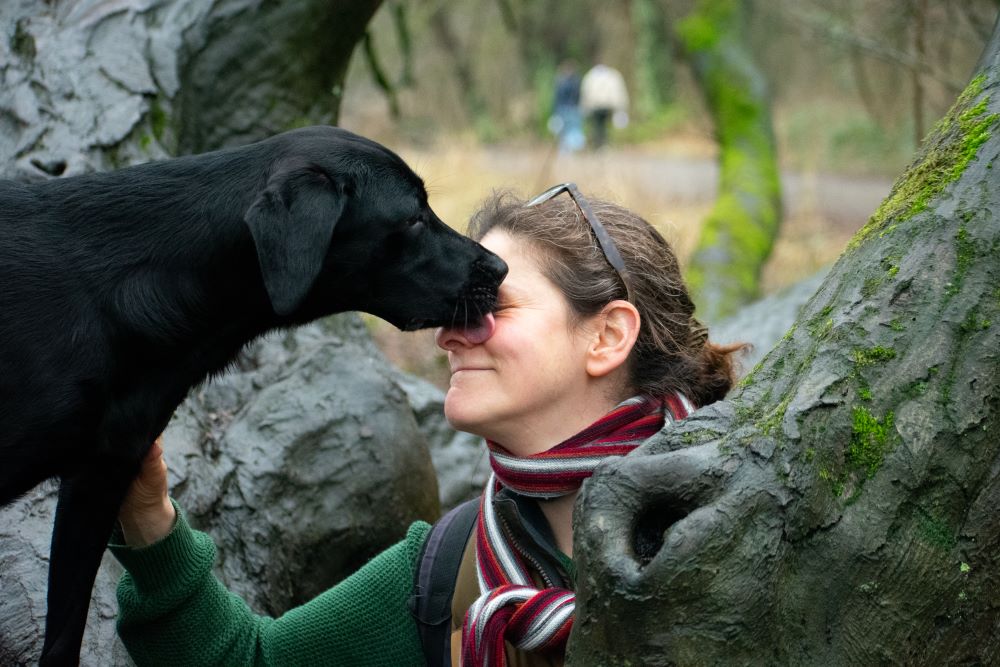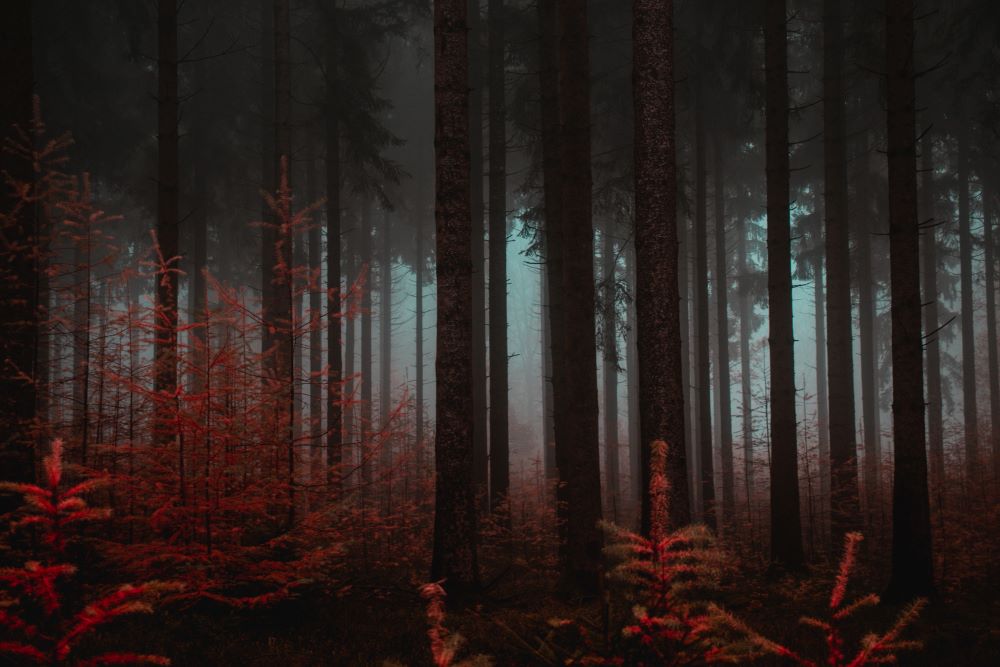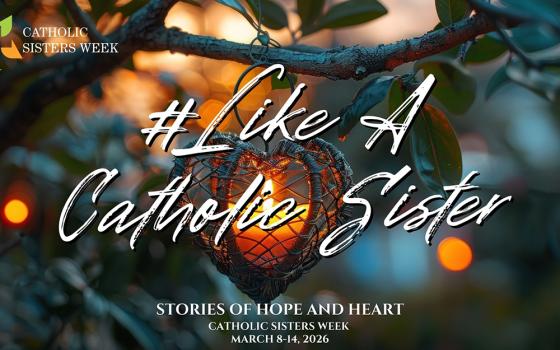
Tara plays with the author's longtime pen pal, who recently moved from the Netherlands to the St. Joseph, Minnesota, area. (Mary Navarre)
A reading from the Book of Proverbs 8:1-12:
Does not Wisdom call, and Understanding raise her voice?
On the top of the heights along the road,
at the crossroads she takes her stand;
by the gates at the approaches of the city, in the entryways she cries aloud:
To you, O people, I call; my appeal is to all.
You who are simple, learn how to make sound judgments.
Listen! For what I say is worth hearing; my mouth proclaims the truth.
Indeed, my mouth hates to lie.
All the words of my mouth are sincere;
all of them are straightforward to the intelligent,
and right to those who attain knowledge.
Accept my lessons instead of silver,
and knowledge in place of gold.
For Wisdom is better than jewelry; no treasures can compare with her.
I, Wisdom, dwell with experience, the source of clear thinking.
"Wisdom is better than jewelry; no treasures can compare with her."
Oh! Wisdom, how we need you now more than ever! You, Sophia, the breath, the power of God, the feminine face of God. Come and show your people the way to salvation.
That reading from Proverbs is one of several books of wisdom grouped together and occurring before the Book of Isaiah, the prophet from whom all the other O Antiphons are taken at this time of year.
Advertisement
These books of wisdom are a needed breath of fresh air. Listen to a few verses:
"What has been, that will be; what has been done, that will be done. Nothing is new under the sun!" (Ecc 1-9) Today we hear: "It is what it is," proving the point that nothing is new under the sun.
"Arise my beautiful one and come …" (Song 2:10).
"Resplendent and unfading is wisdom and she is readily perceived by those who love and found by those who seek her." (Wis 6:12).
Let's do that today. Let's seek her. Wisdom — that beauty ever ancient, ever new. Where shall we find her? We find her in Scripture and traditions. Is she also revealing herself now in new ways, in ways we are missing?
Let's "look around" as Eliza sings in the musical "Hamilton." "Look around, look around, at how lucky we are to be alive right now." There's wisdom in musical theater.
In the Thornton Wilder play "Our Town," Emily exclaims: "Oh earth, you're too wonderful for anybody to realize you!" The wisdom of Emily is reiterated in the theology of Fr. Pierre Teilhard Chardin, who stuns us with his words: "By virtue of Creation, and still more the Incarnation, nothing here below is profane for those who know how to see …" All too wonderful, Pierre and Emily — for those who know how to see!
The arts, the sciences, hold wisdom for those who know how to see. That's the meaning of incarnation, isn't it? God's infusion in this world, on this Earth, in this time.
I would like to share two stories about just that: God incarnate just now.
My pen pal of many years recently moved to Minnesota after decades in the Netherlands. She arrived on Thanksgiving Day with her young dog, Tara. As a dog lover, I wondered how the pup would tolerate what must have been a terrifying experience in the cargo hold of a jet plane; she was alone with strange smells, sights and sounds. How would Tara fare?
Alisa writes: "She [Tara] has so much trust — even when I came to fetch her after the flight, she was not put out or mad, just bursting with joy. Tara is showing me the way, adjusting to her new life without missing a beat. She loves the new smells, the new attention. She seems to accept what is, which is a great way to go through life. Tara seems to appreciate this place, and these smells. She does not seem preoccupied by what — or who — might be missing. She does not seem to be looking for something better. Tara lives in the world as it is and responds in love and joy. She is a mentor, reminding me that we have no control over what happens to us, but we can always choose how to respond."
I want to be like Tara. I want to trust in God's love like Tara trusts Alisa.
We can trust more, but we are not all young Taras, filled with exuberance for what's next. We are mostly – well, old, even ancient! And I ask myself: Is my usefulness drying up? Is this it? Just trust in God and go quietly now?

(Unsplash/Valentin Lacoste)
I love Tara's witness to trust, and I need another metaphor for my life now. That brings us to my second story.
In 1980, a Canadian forester, Suzanne Simard was studying the best way to manage a forest for maximum yields. The practice at the time, called "free to grow," was to clear-cut all trees and other plants, spray with herbicide and replant the tree species that would bring monetary gain. Without competition from other plants, with full access to sun and rain, these seedlings would grow fast and strong, providing a maximum return on the investment.
But they didn’t.
They were sickly, and many died. Why were the saplings not growing in such an optimal "free to grow" environment? Careful observations and controlled scientific studies by Simard yielded an amazing fact — one that her fellow scientists were reluctant to believe at first, especially because she was young and female. She was dismissed as being too sentimental.
Simard discovered that trees thrive through communication via an underground system of mycorrhizal fungi — a mammoth interconnected system of fungi enabling trees to "communicate" with each other. Old trees hold essential wisdom needed by young saplings. These ancient trees are the majestic hubs at the center of the forest through which messages are communicated. They pass their wisdom to their kin, generation after generation, sharing the knowledge of what helps and what harms, who is friend or foe, and how to adapt and survive in an ever-changing landscape. Without the wisdom of these ancient trees, the young seedlings fail to thrive.
There's more. As the ancestor trees near the end of their lifespan, they provide even more vital and essential information and nutrients. At first, they give mostly to their kin, then beyond to all species in the forest, all interconnected through a massive mycorrhizal fungal network, like the first-ever world wide web.
I want to be like the ancient tree that communicates hard-earned wisdom to kith and kin and beyond until the day I am a nurse log on the forest floor. Even then Simard learned, living trees send nutrients to the nurse logs, which spawn more life even in death.
Wisdom reveals herself then and now; we need to look around — everywhere.






